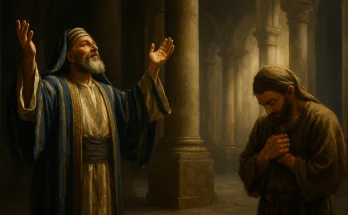Introduction to the Parable of the Fishing Net
Have we ever wondered what the Kingdom of Heaven will truly be like? In the parable of the fishing net in Matthew 13:47-50, Jesus gives us a powerful glimpse. Through a familiar fishing scene, He unveils the coming separation between the righteous and the wicked. This parable paints a vivid picture of God’s judgment, where all are gathered, yet only some will be chosen.
Jesus often used parables to reveal profound truths about God’s Kingdom. With simple, relatable images, He captured essential spiritual lessons. Here, the fishing net gathers “all kinds,” but in the end, only the “good” are kept. This image stirs us to consider our place in God’s Kingdom and what it truly means to live as “good fish” in His eyes.
As we explore the meaning and lessons of this parable, let’s open our hearts to the timeless truths Jesus shares. In studying this, we’ll uncover why God’s judgment is both hopeful and sobering. Are we ready to discover what it takes to be part of His eternal Kingdom?
Setting the Scene
In Matthew 13, Jesus shares a series of parables, each revealing unique insights into the Kingdom of Heaven. This chapter includes the parable of the sower, the mustard seed, and the wheat and weeds. Each parable reveals different aspects of God’s Kingdom, from its growth to the judgment awaiting in the end.
The audience listening to Jesus were ordinary people, including farmers, fishermen, and villagers. Fishing was central to their daily lives, making the parable of the fishing net immediately relatable. Jesus used this familiar imagery to draw His audience into a deeper understanding. They knew the sight of fishermen casting nets, gathering various fish, and sorting them onshore.
In the parable of the fishing net, Jesus builds on themes from earlier parables, especially the wheat and weeds. Both stories highlight a coming separation between the righteous and the wicked. Together, these parables illustrate that God’s Kingdom embraces all but will ultimately judge and separate.
By using everyday images, Jesus helped His audience grasp the realities of Heaven and judgment. Through the parable of the fishing net, He invited them—and us—to consider the serious, eternal outcomes of our lives.
Parable of the Fishing Net Explained
Verse 47: The Kingdom as a Net Gathering All Kinds
In Matthew 13:47, Jesus begins the parable of the fishing net by comparing the Kingdom of Heaven to a fishing net cast into the sea. This net gathers fish of “every kind.” The fishing net represents the reach of God’s Kingdom, cast wide to include people from all backgrounds and walks of life. Just as a net doesn’t discriminate among fish, the message of the Gospel invites everyone to respond. Jesus uses this image to show that God’s invitation is open and inclusive, gathering people from all nations and circumstances.
Verse 48: Sorting the Good from the Bad
In verse 48, Jesus describes how the fishermen pull the net to shore and sort the fish, keeping the good and discarding the bad. This sorting process illustrates a future moment of judgment when the true nature of each person will be revealed. Just as the fishermen evaluate each fish, God will discern between those who have lived faithfully and those who have not. The parable of the fishing net reminds us that, though we are all gathered, there will be a final, serious evaluation of our lives and choices.
Verse 49: Angels Separating the Wicked from the Righteous
In verse 49, Jesus reveals that angels will carry out this separation. At the end of the age, the angels will “separate the wicked from the righteous.” This highlights God’s justice and the reality of judgment, when every individual’s life will be examined. The righteous are those who have lived according to God’s will, while the wicked have chosen a path contrary to His commands. Through the parable of the fishing net, Jesus underscores that judgment will be thorough and just, as God’s angels will faithfully distinguish between those who belong in His Kingdom and those who do not.
Verse 50: The Consequences of Rejection
Finally, in verse 50, Jesus speaks of the “furnace of fire,” where there will be “weeping and gnashing of teeth.” This graphic language emphasizes the seriousness of God’s judgment. The “furnace of fire” symbolizes eternal separation from God, a place of regret and anguish for those who have rejected His invitation. This sobering end in the parable of the fishing net serves as a warning of the real consequences of rejecting God’s call to righteousness.
Connecting the Parable to Judgment and Separation
Each verse in this parable points to the finality of God’s judgment and the separation between those who accept His Kingdom and those who reject it. The parable of the fishing net reminds us that our lives and choices matter eternally. Jesus calls us to respond to God’s invitation, live faithfully, and be found among the “good fish” in His Kingdom.
Symbolism and Meaning
Fishing Net: The Inclusive Reach of the Gospel
In the parable of the fishing net, the net symbolizes the Gospel’s all-encompassing reach. Just as a fishing net gathers all kinds of fish, the Gospel invites everyone to respond to God’s call. This shows the inclusivity of God’s Kingdom—no one is excluded from the invitation. Jesus wants us to understand that the Gospel is open to all, reaching across backgrounds, cultures, and pasts. The parable emphasizes that God desires everyone to hear the message of salvation.
Fish: Representing Different Types of People
The fish in the parable of the fishing net represent the diverse people who respond to the Gospel. Each fish symbolizes a person with unique qualities, decisions, and life paths. Just as a net captures fish of various kinds, the Kingdom of Heaven brings together people from different spiritual conditions. Some are righteous, committed to living according to God’s ways, while others live in disobedience. This diversity highlights the different responses to God’s message and the choices each person makes about living according to His will.
Sorting: The Final Judgment
The sorting process represents the final judgment, when God will distinguish between the righteous and the wicked. In the parable, the fishermen keep the “good” fish and discard the “bad,” symbolizing God’s ultimate separation of those who belong to Him and those who don’t. This sorting shows that while God’s Kingdom is open to all, there is an expectation for righteousness. Judgment will be fair and thorough, led by God’s perfect knowledge of every heart.
The Inclusive Yet Ultimate Separation of God’s Kingdom
Through these symbols, Jesus reveals the inclusive yet decisive nature of His Kingdom. The Gospel invitation is universal, yet only those who choose God’s ways will remain. The parable of the fishing net teaches that while God’s love reaches everyone, His judgment will ultimately separate those who accept His call from those who reject it.
Lessons from the Parable
Lesson 1: God’s Kingdom Includes All, but Not All Will Be Chosen
The parable of the fishing net teaches that God’s Kingdom welcomes everyone. Just as the fishing net gathers all kinds of fish, the Gospel’s invitation is open to all people. However, this inclusivity does not guarantee everyone’s place in God’s eternal Kingdom. Only those who respond to God’s call with faith and obedience will be chosen. This lesson reminds us that while God’s love reaches everyone, our personal response to Him matters deeply.
Lesson 2: Judgment is Inevitable—Choices Have Consequences
A key lesson from the parable of the fishing net is that judgment is certain. The sorting process symbolizes a time when God will evaluate every person’s life and choices. Just as the fishermen separate the good fish from the bad, God will distinguish between the righteous and the wicked. This reality challenges us to take our choices seriously, knowing they carry eternal consequences. The parable urges us to live with an awareness of this coming judgment.
Lesson 3: The Role of Righteousness and Living According to God’s Will
The parable of the fishing net highlights the importance of righteousness. Those who live in alignment with God’s will are represented by the “good” fish kept by the fishermen. Righteousness is not merely about good behavior but about living in a way that reflects God’s character and commands. This lesson teaches that those who belong to God’s Kingdom seek to live lives marked by integrity, faithfulness, and love. Jesus’ teaching challenges us to examine our hearts and actions, asking if they align with God’s desires.
Lesson 4: Responsibility of Believers to Live in Preparation for God’s Kingdom
The parable reminds believers of their responsibility to live in readiness for God’s Kingdom. We are called to be vigilant, reflecting on whether we are “good fish” prepared for the coming judgment. This means living with purpose, prioritizing spiritual growth, and avoiding distractions that pull us away from God’s will. It also means sharing the Gospel with others, helping others understand the call to enter God’s Kingdom.
A Call to Live with Eternal Perspective
The parable of the fishing net calls us to live with an eternal perspective. Jesus uses this parable to teach us that our lives and choices are not temporary but carry everlasting significance. As we learn from this parable, we are encouraged to live in a way that aligns with God’s Kingdom, fully aware of His invitation, the reality of judgment, and the call to righteousness.
Application for Today
The parable of the fishing net offers valuable lessons on how believers can live with eternal priorities. It reminds us that God’s Kingdom is open to everyone, yet judgment will separate those who live righteously from those who don’t. This parable encourages us to evaluate our lives honestly. We might ask, “Am I living as a ‘good fish’ in God’s eyes?” This self-assessment is essential, urging us to reflect on whether our actions, attitudes, and values align with God’s will.
To pursue righteousness, we must actively seek God’s guidance through prayer, studying His Word, and applying His teachings in our daily lives. Pursuing righteousness is more than following rules; it’s about reflecting God’s love, mercy, and holiness in everything we do. When we make choices based on what pleases God rather than worldly desires, we show our commitment to His Kingdom.
Sharing the Gospel is also a vital part of living with eternal priorities. Like the net in the parable of the fishing net, our goal is to reach others, helping them understand God’s love and the importance of choosing a life that aligns with His truth. Whether through words or actions, we can share God’s message and demonstrate His grace. This parable reminds us that life is more than the present—it’s about preparing for eternity and helping others see the path to God’s Kingdom. Living with an eternal perspective means choosing righteousness, sharing God’s truth, and focusing on what truly matters in light of God’s coming Kingdom.
Parable of the Fishing Net Conclusion
The parable of the fishing net teaches us profound truths about God’s Kingdom, judgment, and the choices that shape our eternal future. Jesus shows that while everyone is invited into God’s Kingdom, only those who live in alignment with His will are ultimately chosen. This parable underscores the reality of judgment, where the righteous and the wicked will be separated, just as fishermen sort fish.
For believers, this message brings both hope and urgency. We find hope in God’s promise of salvation and a place in His Kingdom, yet we are reminded of the need for sincere, righteous living. Understanding God’s judgment calls us to evaluate our lives carefully, asking if we are truly reflecting His ways.
The parable of the fishing net is a call to respond to the Gospel’s invitation wholeheartedly. It urges us to live in a way that pleases God, to pursue righteousness, and to share His truth with others. As we strive to be “good fish,” may we keep our eyes on eternity, living in a way that honors God and prepares us for His eternal Kingdom.
Frequently Asked Questions (FAQ) About Parable of the Fishing Net
1. What is the main lesson of the parable of the fishing net? The main lesson is about the inclusivity of God’s Kingdom and the final judgment. Jesus teaches that while everyone is invited, only those who live righteously will be chosen. This parable emphasizes that our choices have eternal consequences, urging us to live according to God’s will.
2. Why did Jesus use a fishing net in this parable? Jesus used the fishing net because it was familiar to His audience, many of whom were fishermen. This imagery helped them understand the Gospel’s reach and the idea of gathering people from all walks of life. The sorting of fish represented the final judgment, a concept His listeners could easily grasp.
3. How can we apply the parable of the fishing net in our lives today? We can apply this parable by examining our lives to see if we are living in a way that aligns with God’s will. This means pursuing righteousness, sharing the Gospel with others, and preparing for God’s Kingdom by focusing on eternal priorities.



